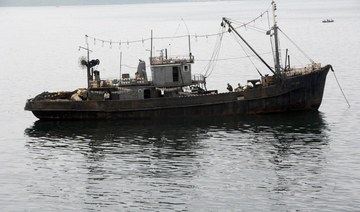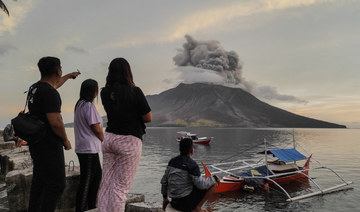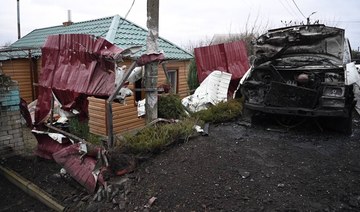SEOUL, South Korea: North Korean leader Kim Jong Un vowed to surmount US-led sanctions he says have inflicted “many hardships and trials” on his country, state media reported Wednesday, days after his country’s first nuclear negotiations with the US in more than seven months fell apart.
State media also showed Kim riding a white horse to climb North Korea’s sacred Mount Paektu. Kim has often visited the mountain, the highest point on the Korean Peninsula, before making major decisions such as the 2013 execution of his powerful uncle and his 2018 entrance into diplomacy with Seoul and Washington.
South Korean media quickly speculated Kim may be considering a new strategy in his dealings with the US because he’s previously demanded Washington come up with new proposals to salvage the stalemated diplomacy by the end of December.
“He, sitting on the horseback atop Mt Paektu, recollected with deep emotion the road of arduous struggle he covered for the great cause of building the most powerful country with faith and will as firm as Mt Paektu,” the North’s official Korean Central News Agency said.
North Korean documents say Kim’s grandfather and national founder Kim Il Sung had an anti-Japan guerrilla base on the slopes of Paektu during Japan’s 1910-45 colonial rule of the Korean Peninsula. The official biography of Kim Jong Un’s father, Kim Jong Il, says the second-generation leader was born on Paektu when a double rainbow filled the skies.
The white horse is also a propaganda symbol for the Kim family who has ruled North Korea for seven decades with a strong personality cult surrounding family members. State media have occasionally shown Kim, his sister and his father riding white horses. The symbolism goes back to Kim Il Sung, who according to the North’s official narrative, rode a white horse while fighting against Japanese colonial rulers.
KCNA said Kim also visited nearby construction sites in Samjiyon County and complained about US-led UN sanctions imposed on his country because of its nuclear and nuclear programs.
“The situation of the country is difficult owing to the ceaseless sanctions and pressure by the hostile forces and there are many hardships and trials facing us,” Kim was quoted as saying. “But our people grew stronger through the trials and found their own way of development and learned how to always win in the face of trials.”
Kim also said “the pain the US-led anti-(North Korea) hostile forces inflicted upon the Korean people ... turned into their anger,” according to KCNA. “No matter what persistent efforts the enemy make, we can live well with our own efforts and pave the avenue to development and prosperity in our own way.”
North Korea has been slapped with a total of 11 rounds of sanctions since 2006. The sanctions have been toughened since 2016 when Kim began conducting a series of high-profile nuclear and missile tests, and they include a full ban on key exports such as coal, textiles and seafood and a significant curtailing of oil imports.
During his second summit with President Donald Trump in Vietnam in February, Kim demanded the United States lift the newer and more biting sanctions in return for dismantling his main nuclear complex, a limited denuclearization step. Trump rejected that, and the summit collapsed without reaching any deal. The two leaders held a brief, impromptu meeting at the Korean border in late June and agreed to resume talks.
Their nuclear negotiators met in Stockholm for the first time since the Vietnam summit earlier this month but the talks broke down again. North Korea blamed the US for the talks’ breakdown and threatened to resume nuclear and long-range missile tests.
Kim vows to fight US sanctions, visits sacred N. Korean peak
Kim vows to fight US sanctions, visits sacred N. Korean peak

- The Korean Central News Agency says Kim also visited nearby construction sites and complained about sanctions imposed on his country because of its nuclear weapons program
Man arrested after Denmark’s Billund Airport evacuated over bomb threat
COPENHAGEN: A man was arrested in Denmark on Saturday in connection with a bomb threat at Billund Airport, the country’s second largest aviation hub, police said in a statement.
The airport, in central western Denmark, was evacuated and remains shut following the threat.
“The evacuation has proceeded calmly and as expected, with travelers following our instructions,” police inspector Michael Weiss said in a statement.
Investigations into the incident are continuing, the police said, adding it was not clear when the airport would reopen.
Indonesia on highest alert as Sulawesi volcano continues to erupt
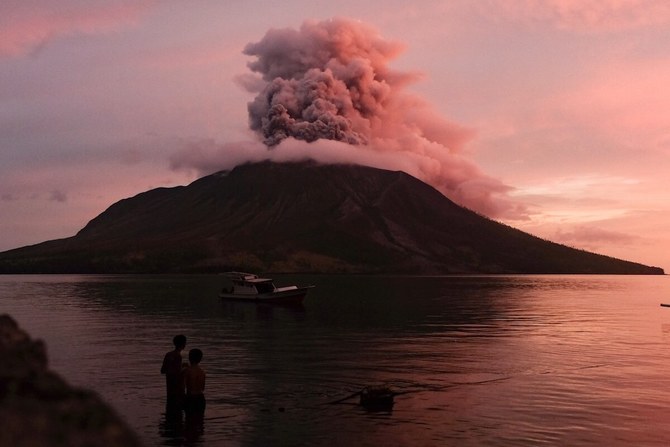
- Over 7,500 people living near the volcano have so far been evacuated
- Volcanic activity is common in Indonesia, which lies on the Pacific ‘Ring of Fire’
JAKARTA: Indonesian authorities were on the highest alert on Saturday as a volcano in North Sulawesi continued to erupt. Thousands living nearby have been forced to leave their homes.
Mount Ruang, located on the northern side of Sulawesi Island, had at least eight eruptions since April 16, including a major one on Wednesday evening, which prompted Indonesia’s volcanology agency to issue its highest alert, which indicates an active eruption.
The center recorded at least two eruptions on Saturday, with the crater emitting white-gray smoke more than 1,200 meters above its peak after midnight, followed by another eruption at noon that released an ash column of about 250 meters.
“Based on visual observations, as of April 20, 2024, at 12:15 p.m., there is still high volcanic activity in Mt. Ruang,” Muhammad Wafid, head of the geology department at the Ministry of Energy and Mineral Resources, said in a statement.
“The potential danger is an explosive eruption that may cause the mountain to spew volcanic rocks in different directions, followed by clouds, as well as effusive eruption, or lava flow.”
With authorities having established a six-kilometer exclusion zone around the volcano, around 7,500 people have so far been evacuated, including more than 1,500 residents who live on the smaller island where Mount Ruang stands, and around 6,000 people living on neighboring Tagulandang island, northeast of the volcano, according to the latest data from Indonesia’s National Disaster Mitigation Agency. Thousands more are still at risk.
The international airport in Manado city, less than 100 kilometers away from Mount Ruang, is closed until at least Sunday because of volcanic ash.
“There are still concerns, because tremors and volcanic earthquakes are still being recorded by our devices, indicating magmatic fluid supply is still moving from the depth to the surface,” Hendra Gunawan, who heads Indonesia’s volcanology agency, told Arab News.
“There’s still potential for more eruptions … And a tsunami may occur if there is a large flow of volcanic material into the sea.”
Indonesia, a vast archipelago nation, has around 120 active volcanoes. The country experiences frequent seismic and volcanic activity due to its location on the arc of volcanoes and fault lines in the Pacific Basin known as the “Ring of Fire.”
Moscow says 50 Ukrainian drones shot down as attacks spark fires at Russian power stations
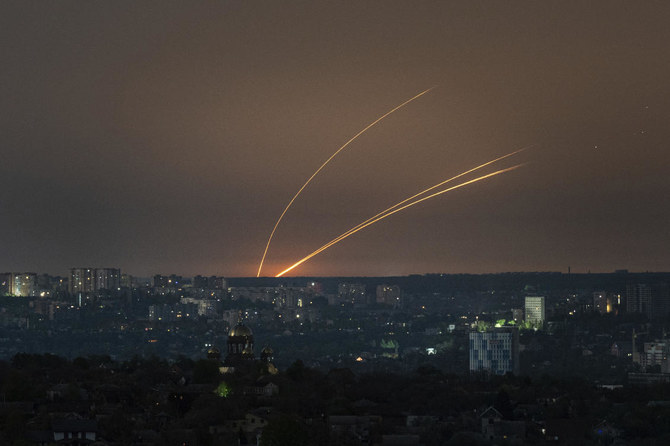
- Fifty drones were shot down by air defenses over eight Russian regions, including 26 over the country’s western Belgorod region
- Russia’s Defense Ministry said that it had shot down a Ukrainian Sukhoi Su-25 fighter jet
KYIV: Ukraine launched a barrage of drones across Russia overnight, the Defense Ministry in Moscow said Saturday, in attacks that appeared to target the country’s energy infrastructure.
Fifty drones were shot down by air defenses over eight Russian regions, including 26 over the country’s western Belgorod region close to the Ukrainian border. Two people — a woman with a broken leg and the man caring for her — died during the overnight barrage, after explosions sparked a blaze that set their home alight, Belgorod Gov. Vyacheslav Gladkov wrote on social media. A pregnant woman and her unborn child were also killed in shelling later Saturday, he said.
Drones were also reportedly destroyed over the Bryansk, Kursk, Tula, Smolensk, Ryazan, Kaluga regions across Russia’s west and south, as well as in the Moscow region.
Russia’s Defense Ministry said that it had shot down a Ukrainian Sukhoi Su-25 fighter jet. It provided no details and the claims could not be independently verified.
Ukrainian officials normally decline to comment about attacks on Russian soil. However, many of the drone strikes appeared to be directed toward Russia’s energy infrastructure.
The head of the Kaluga region, Vladislav Shapsha, said Saturday that a drone strike had sparked a blaze at an electrical substation, while Bryansk Gov. Alexander Bogomaz and Smolensk Gov. Vasily Anokhin also reported fires at fuel and energy complexes.
In recent months, Russian refineries and oil terminals have become priority targets of Ukrainian drone attacks, part of stepped-up assaults on Russian territory.
Ukrainian drone developers have been extending the weapons’ range for months, as Kyiv attempts to compensate for its battlefield disadvantage in weapons and troops. The unmanned aerial vehicles are also an affordable option while Ukraine waits for more US military aid.
Moscow also said Friday evening that an American citizen known to have fought with Kremlin-backed separatists in Ukraine between 2014 and 2017 had died in the Russian-occupied Donetsk region.
Russell Bentley, 64, was no longer involved in military operations and previously worked for state-owned Russian news agency Sputnik. His death was confirmed by his former battalion and by Margarita Simonyan, head of the state-funded television channel RT, who described him as “a real American.” He used the call-sign “Texas” and had spent time in prison on charges of drug smuggling before leaving the United States.
No information has been released as to the cause of Bentley’s death, but local police had previously reported the American as missing on April 8.
Meanwhile, Russia attacked Ukraine overnight with seven missiles, and air defenses downed two missiles and three reconnaissance drones, the Ukrainian air force said Saturday.
Gov. Oleh Kiper, head of Ukraine’s Odesa region, said that ballistic missiles had damaged infrastructure overnight, but did not provide further details. Previous attacks on the Black Sea city on Friday damaged port infrastructure, including two food export terminals, Ukrainian President Volodymyr Zelensky said.
Russian shelling also killed two men, including an 81-year-old pensioner in the city of Vovchansk, said Gov. Oleh Syniehubov, head of Ukraine’s Kharkiv region.
A 60-year-old woman was also injured after shelling struck a nine-story apartment block, he said.
Efforts underway to bring home Filipinos killed in UAE floods
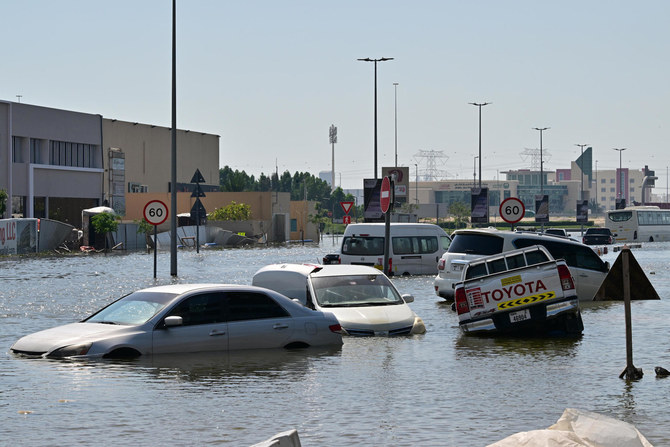
- At least three Filipinos lost their lives in the unprecedented flooding
- Philippine consulate received assistance requests from at least 100 Filipinos
Manila: The Philippine government is assisting Filipinos affected by the record-high rains and flooding that hit the UAE this week, authorities said on Saturday, as it works to repatriate the nationals who lost their lives.
A strong storm first hit Oman last weekend, killing at least 20 people, before it pounded the UAE on Tuesday, marking the heaviest rains in 75 years and bringing the Gulf state to a standstill.
The Philippine Department of Migrant Workers has confirmed the deaths of at least three Filipinos who died in road accidents as their vehicles were submerged in floodwaters.
Philippine Consul General Marford Angeles told Arab News the consulate had received assistance requests from at least 100 Filipinos — some working in the UAE, some studying, and some transiting via Dubai.
“Over 1 million Filipino nationals are currently residing in the UAE ... Majority of assistance requests received by the consulate so far originate from the populous emirates of Dubai and Sharjah, reflecting the concentration of Filipino residents in these areas,” he said.
“The unprecedented weather conditions in the UAE affected most residents.”
The three Filipinos who lost their lives in the floods were two women who died inside their flooded vehicle, and a man who died after sustaining major injuries when his vehicle fell into a sinkhole. His two passengers have been hospitalized.
“The Department of Migrant Workers, through its Migrant Workers Offices in Dubai and Abu Dhabi, is working with local authorities for the repatriation of the remains of three overseas Filipino workers (OFWs) who died during the severe flooding,” the DMW said in a statement.
“Two other OFWs, both male, suffered injuries from the vehicular accident that happened in the sinkhole. They are recuperating from their injuries.”
US House to vote on long-awaited $95 billion Ukraine, Israel aid package

- Some hard-line Republicans have voiced strong opposition to further Ukraine aid
WASHINGTON: The Republican-controlled US House of Representatives on Saturday is set to vote on, and expected to pass, a $95 billion legislative package providing security assistance to Ukraine, Israel and Taiwan, over bitter objections from party hard-liners.
More than two months have passed since the Democratic-majority Senate passed a similar measure and US leaders from Democratic President Joe Biden to top Senate Republican Mitch McConnell have been urging embattled House Speaker Mike Johnson to bring it up for a vote.
Johnson this week chose to ignore ouster threats by hard-line members of his fractious 218-213 majority and push forward the measure that includes some $60.84 billion for Ukraine as it struggles to fight off a two-year Russian invasion.
The unusual four-bill package also includes funds for Israel, security assistance for Taiwan and allies in the Indo-Pacific and a measure that includes sanctions, a threat to ban the Chinese-owned social media app TikTok and the potential transfer of seized Russian assets to Ukraine.
“The world is watching what the Congress does,” the White House said in a statement on Friday. “Passing this legislation would send a powerful message about the strength of American leadership at a pivotal moment. The Administration urges both chambers of the Congress to quickly send this supplemental funding package to the President’s desk.”
A bipartisan 316-94 House majority on Friday voted to advance the bill to a vote, and Senate Majority Leader Chuck Schumer told senators to be ready to work over the weekend if it passes the House as expected.
“It’s not the perfect legislation, it’s not the legislation that we would write if Republicans were in charge of both the House, the Senate, and the White House,” Johnson told reporters on Friday. “This is the best possible product that we can get under these circumstances to take care of these really important obligations.”
Some hard-line Republicans have voiced strong opposition to further Ukraine aid, with some arguing the US can ill afford it given its rising $34 trillion national debt. They have repeatedly raised the threat of ousting Johnson, who became speaker in October after his predecessor, Kevin McCarthy, was ousted by party hard-liners.
Representative Bob Good, chair of the hard-line House Freedom Caucus, told reporters on Friday that the bills represent a “slide down into the abyss of greater fiscal crisis and America-last policies that reflect Biden and Schumer and (House Democratic leader Hakeem) Jeffries, and don’t reflect the American people.”
But Republican presidential candidate Donald Trump, who carries huge influence in the party, on April 12 voiced support for Johnson and in a Thursday social media post said Ukraine’s survival is important for the US
The bills provide $60.84 billion to address the conflict in Ukraine, including $23 billion to replenish US weapons, stocks and facilities; $26 billion for Israel, including $9.1 billion for humanitarian needs, and $8.12 billion for the Indo-Pacific.







